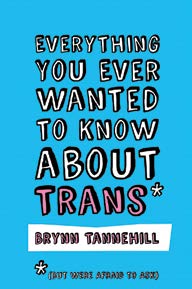Michele Karlsberg: In trans activist, writer and former naval aviator Brynn Tannehill’s new book, Everything You Ever Wanted to Know About Trans (But Were Afraid to Ask), she breaks down deeply held misconceptions about trans people across all aspects of life. The book, released by Jessica Kingsley Publishers a few months ago, has been hailed by reviewers as “thoroughly researched,” “beautifully written,” and “one-of-a-kind.”
It is aimed at all audiences, from those who identify as transgender to those with little knowledge of the community who are looking to learn more. In this excerpt from the chapter titled “Politics,” Tannehill expounds on how the transgender bathroom bill has affected trans youth.
In 2015, the South Dakota legislature passed a law banning transgender students from bathrooms, enacting part of the FRC’s plan to make life nearly impossible for transgender people. While Governor Daugaard vetoed the bill, North Carolina followed with a bathroom bill (which mostly targeted students) shortly thereafter.
While these bills called for “reasonable accommodations,” this has resulted in separate and unequal situations for transgender students, wherein inconvenient facilities are offered as a false compromise. The result are students who either miss class, is punished for being tardy, or suffer kidney and urinary tract infections as a result of “holding it” or deliberately dehydrating themselves.
Other students have suffered the humiliation of being treated like potential sex offenders, being followed around by school staff to make sure they use a separate bathroom, or even faced plans to issue them wrist bands identifying them as transgender so other students can report them. These consequences of “separate but equal” facilities have been observed in North Carolina and across the country where transgender students are banned from facilities.
The South Dakota bill, as was written, considered it a reasonable accommodation to make a transgender child “hold it” until a teacher is available to escort them to a single-stall bathroom like some sort of suspected 7-year-old sex offender. Where similar policies were implemented, younger students suffered the humiliation of urinating all over themselves because the teacher was too busy to escort them to the bathroom. If a school principal decided he simply did not want to have a transgender student at school, many of these laws would legally protect them if they told the student, “There are no bathrooms here that you are allowed to use, so you will have to leave school permanently.”

This will cause a student to choose between losing access to education or attempting to conceal and repress their gender identity at school. One South Dakota state senator cited the desistance myth in his support of the bill, remarking that these kids are probably just going to change their minds anyway, so why not encourage them not to be transgender?
Never mind that rejection and isolation didn’t work out so well for Leelah Alcorn, and the 57 percent of trans kids who attempt suicide in unsupportive environments, according to one study. Chapter 4 describes the close relationship between discrimination, stigma, minority stress, abuse, and suicide attempts in transgender youth.
If anyone thinks for a moment that very few adults would do such horrible things to transgender kids, try watching the 14-year-old transgender teen Jazz Jennings read the parade of online threats from adults to torture and murder her. Talk to most parents of transgender children and they can share all about the threats they receive from community members threatening to kill a transgender child if the parents or their children find the transgender child in the “wrong” bathroom. Other parents of transgender youth have told me how parents and students have told their child they should kill themselves.
Now consider again, how far of a stretch of the imagination is it to envision a social conservative school administrator forcing a child to leave school in comparison?
It is time to stop calling these “bathroom bills” and anti-transgender bills. Instead, call them what they are: an attempt to make it impossible to be a transgender student in America.
Brynn Tannehill is a leading trans activist and essayist, and has written for “The New York Times,” The Huffington Post, Bilerico, Slate, Salon, “USA Today,” “The Advocate,” LGBTQ Nation and The New Civil Rights Movement, as a blogger and featured columnist.
A leader in Gender Diversity books, Jessica Kingsley Publishers publishes informative guides for professionals, parents, children, teens and the general reader. For more information, visit https://www.jkp.com/index.php?uk
Michele Karlsberg Marketing and Management specializes in publicity for the LGBTQI community. This year, Karlsberg celebrates 31 years of successful book campaigns.
Recent Comments